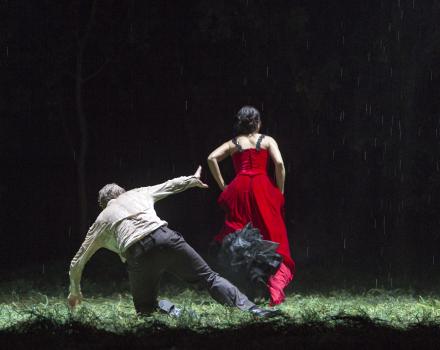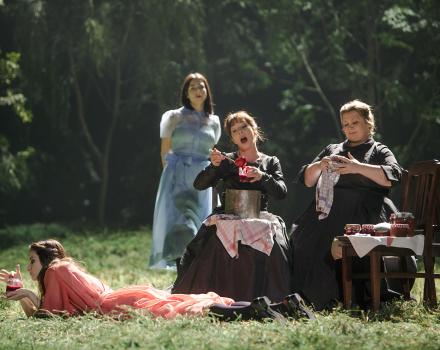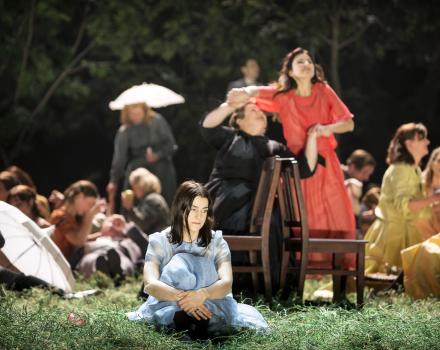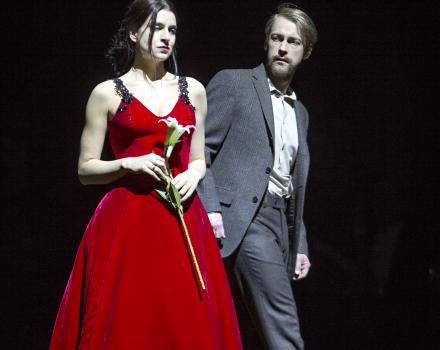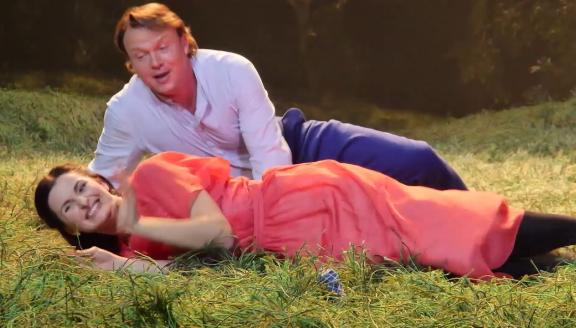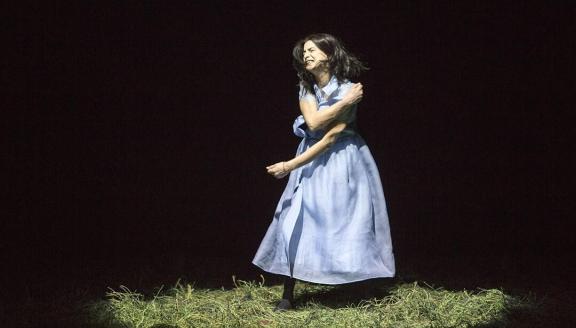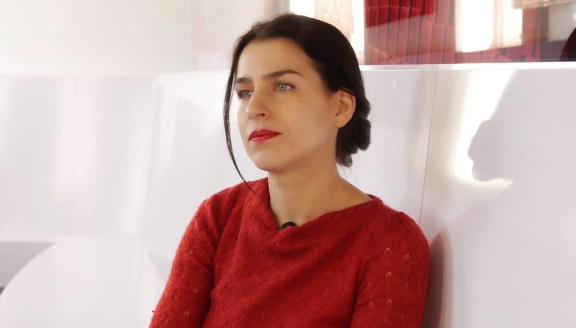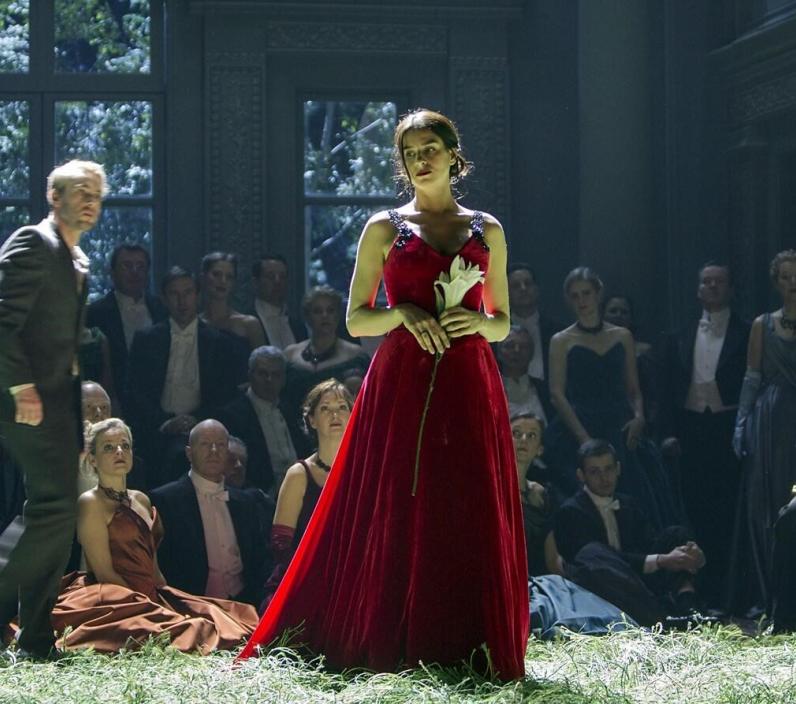

Eugene Onegin

When a young poet visits his fiancée bringing along a mysterious friend, her introverted sister falls head over heels in love only to be coldly rejected. Years later they meet again...
Not only did Eugene Onegin ensure Tchaikovsky’s breakthrough as an opera composer, it was also a unique contribution to modern music theatre, offering a sweeping panorama of young people’s emotions. Barrie Kosky's staging features an opulent stage design that underscores the poetry of the characters and their tragedy with the vastness of natural space as a metaphor.
Cast
|
Tatjana
|
Asmik Grigorian
|
|---|---|
|
Olga
|
Karolina Gumos
|
|
Larina
|
Christiane Oertel
|
|
Filipyevna
|
Margarita Nekrasova
|
|
Lensky
|
Aleš Briscein
|
|
Yevgeny Onegin
|
Günter Papendell
|
|
Captain
|
Carsten Lau
|
|
Triquet
|
Christoph Späth
|
|
Zaretsky
|
Yakov Strizhak
|
|
Prince Gremin
|
Alexey Antonov
|
|
Chorus
|
Choir soloists of the Komische Oper Berlin
|
|
Orchestra
|
Komische Oper Berlin Orchestra
|
| ... | |
|
Music
|
Pyotr Ilyich Tchaikovsky
|
|---|---|
|
Conductor
|
Henrik Nánási
|
|
Director
|
Barrie Kosky
|
|
Sets
|
Rebecca Ringst
|
|
Lighting
|
Franck Evin
|
|
Costumes
|
Klaus Bruns
|
|
Chorus master
|
David Cavelius
|
| ... | |
Video
The story
Act I
A summer day idyll in the Russian province spent doing what one does on such days: In the midst of an excursion of country folk, the landowner Larina chats with her faithful domestic Filippevna, her daughters Olga and Tatyana’s nurse. The two old women make jam and take a trip down memory lane remembering how they yearned for love and were tested by disappointment. Larina's daughters sing a song, the fun-loving Olga dances, her introverted sister Tatjana prefers to leaf through novels. Olga's fiancé, the young poet Lenski, appears declaring love to his betrothed yet again. He’s accompanied by an unknown person whom he introduces as his friend and neighbour: Yevgeny Onegin.
That very evening, Tatyana’s fate is sealed. She is in love, she confesses to her nurse Filippevna, and writes a love letter to Onegin overnight. But the next day Onegin coolly rejects Tatiana's revelation.
Act II
The Larin family hosts a party on Tatyana’s name day; the guests drink and dance and the Frenchman Triquet recites a couplet for Tatyana to everyone’s delight. Onegin alone is not the least amused and flirts with Olga to Lensky’s great annoyance. The two men argue, scandalizing the guests, and Lensky challenges Onegin to a duel. This ends in catastrophe: Onegin kills his friend.
Act III
After years of aimless travelling, Yevgeny Onegin arrives in Saint Petersburg at a ball in the Prince Gremin’s house. Gremin is newly married to Tatyana. Alone, confused and in love, Onegin meets Tatyana and begs her to come with him. Both remember that summer in the country with tears in their eyes. Tatiana, once rebuffed, rejects Onegin: It is irrevocably too late. She is married and Onegin's fate is no longer tied to hers...
Insights
Onegin’s Dream
It was back in 2015, during OperaVision’s early days, and Komische Oper Berlin was new to live streaming. Once convinced, its Intendant Barrie Kosky was characteristically bold and whole-hearted in his commitment. He offered the première of his new production of Jewgeni Onegin. It was taking a risk without a safety net, and no one knew if it would work. Its triumphant success led to a series of live streamed premières from the same address, and established the Komische Oper as one of the project’s lead partners.
Kosky loves the rural intimacy of the opening scene, with the older women making jam. He sets his Onegin in the countryside, where the apparent peace of lazy habit covers an unquiet longing, such as you may find in the plays of Chekhov. Underpinning all the characters is the question: ‘what would happen, if...?’ These characters search for love and fulfilment, but the timing is all wrong.
The starting point for Tchaikovsky was Tatjana. Pushkin’s original poem describes her as ‘shy as a savage, silent, tearful / wild as a forest deer and fearful’. It is her sleepless night, when she writes the letter confessing her love to Onegin, which precipitates the tragic action. Kosky took another huge risk by playing the climax of this scene with Tatjana’s back to the audience, when she asks: ‘Could all my dream be self-delusion? / Am I too innocent to tell?’ He was able to do so, because of the extraordinary expressive power of Asmik Grigorian. Her journey through the opera from gauche young girl through awakening womanhood to poised but still vulnerable princess is mesmerising.
With such an artist at its centre, it is easy to accept the writer Igor Turgenev’s assertion that Tchaikovsky should have re-titled his opera Tatjana Larina, but that would underestimate the composer’s skill, and that of Günter Papendell in the title role, in charting Onegin’s journey, which is the reverse of Tatjana’s. He first appears in Act 1, in Tchaikovsky’s own description, as ‘a cold and heartless dandy’ but hides his own vulnerability under superficial poise. His moment of awakening comes in Act 2 when his thoughtless actions lead him to kill his best friend Lensky. By Act 3, he exposes his innermost soul as painfully as does Tatjana in Act 1.
What if...? The most poignant moment in the opera comes at the still centre of their final duet, when Tatjana and Onegin join together to sing: ‘Happiness was once so near us’. It is then that we understand that this opera is as much Onegin’s dream and lost illusion as it is Tatjana’s.
To Tchaikovsky, happiness is a mirage. It exists, unattainable, beyond the endless steppe of the Russian countryside. Once, when we were too young to feel its presence, it was within our grasp. Now, it is gone for ever.
At least, thanks to the generosity of Komische Oper Berlin, it is again possible to re-live this memorable first night of 31 January 2016.
Gallery
